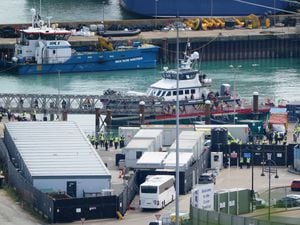Dee Stitt: I was helping improve youth education
The loyalist ex-prisoner resigned from his role at Charter NI last year following ‘negative’ media attention.

Dee Stitt has said a major Stormont-funded project which he led was all about improving young people’s chances of education.
The loyalist ex-prisoner resigned as chief executive of Charter NI last year following “negative” media attention.
The East Belfast-based group received funding worth £1.7 million from the former Stormont Executive.
Mr Stitt said: “That was making a positive difference in our area and community, that is what we did for 10 or so years and that is why we are here today.”
He said the Strategic Investment Fund (SIF) grant was about filling the gaps within his community.
He addressed a seminar in Co Antrim on Wednesday as part of an Open Doors Project with former paramilitary inmates.
He said: “We are all working together in the Open Door Project and building positive relations between former enemy groups, that is what we are doing, and I think we have made a real positive difference.”
Charter NI is a community-based organisation in east Belfast, set up in 2000, which aims to provide people with training and employment opportunities.
Mr Stitt stepped aside as chief executive in September.
On Wednesday, he said: “SIF was getting involved in projects that were there to create employment opportunities for our people that were educated.
“So we were lobbying for projects at a Government level that was going to fill the gaps within our community, that was going to educate and give people the opportunities to get into employment.
“Furthermore, it was going to give our ex-prisoners and combatants the opportunity of getting into employment.
“So that was the strategy that we implemented within Charter NI and that took us to that level.”
Mr Stitt recalled his release from prison more than 20 years ago.
He said: “When I got out of prison in 1997 there was nothing there for me when I got out.”
He faced the barriers to employment confronted by all who had engaged in politically-motivated violence.
“Ex-prisoners and ex-combatants were taking the lead in taking a role in education within their own immediate areas.
“Former military leaders in the areas were educating themselves.
“Before, they had skills but they put those skills to other uses during the conflict.
“They transferred those skills into that education field.”
Members of the community saw the “former combatants” educating themselves, Mr Stitt said.
“That was giving our young people the inspiration to get involved in those processes themselves whenever education was not valued within loyalist communities at that particular time.
“That was giving our people the confidence to get into the employment sector.”





